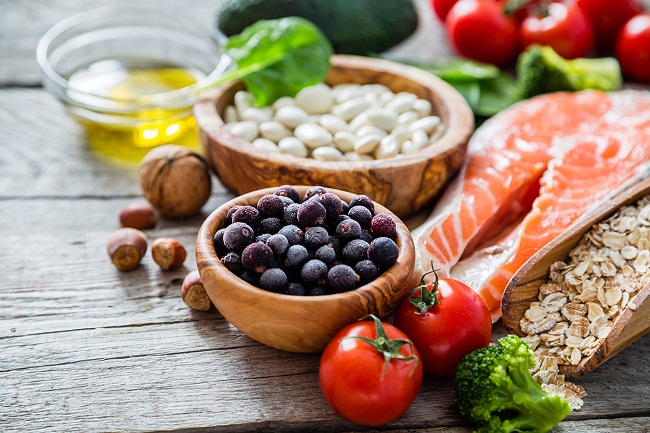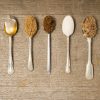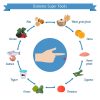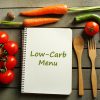Every day we see in newspapers and the news feeds of our smartphones that garlic is good to lower cholesterol and blood pressure, flax seeds are useful to relieve constipation and ulcerative colitis, and spinach is good for eyesight and bone health. Every health conscious individual looks for super foods that can help them prevent diseases or manage their existing conditions. This is because food is medicine.
Many chronic conditions like diabetes mellitus, high cholesterol, high blood pressure, and obesity can be managed with the help of certain foods. However, the media is also bombarded with food information and specific types of diets making it difficult for someone to choose the right foods and the correct diets. For example, it can really be perplexing for a person to choose the best diet for diabetes.
Types of diets
One can really get confused or convinced. There are so many diets for weight loss, heart health, diabetes, and fertility. There are diets that are supposed to suit your blood type, diets that reduce inflammation, and diets that are capable of detoxifying you. It can be very messy and wrong choices of course can lead to malnutrition or worse, diseases.
Here is a list of popular diets:
- Atkins diet
- Paleo diet
- Gluten-free diet
- Swank diet
- Calorie-restriction diet
- Best bet diet
- SlimFast diet
- South Beach diet
- Cambridge diet
- Dukan diet
- Mediterranean diet
Diets like Atkins advocate restriction of carbohydrates and increase in protein and full-fat dairy intake. Due to the high protein and high cholesterol levels, this is not the best diet for diabetes as it can lead to ketosis, kidney problems, and heart attack.
Paleo diet is based on hunter-gatherer diet. It advocates in the consumption of meat, animal products, nuts and seeds, fruits, roots, tubers, and leaves. This diet does not advocate consuming processed foods, but encourages high protein and high fat foods. By eliminating whole grains, dairy, and legumes there can be serious nutritional deficiencies. High consumption of saturated fats can lead to high cholesterol levels and thus cardiovascular diseases.
Diets such as these which believe in reducing an entire food group and increasing the consumption of another does not give total nutrition and are not balanced diets for diabetes.
Mediterranean diet
Among all these forms of diet, the Mediterranean diet, a diet followed by people of Mediterranean region is well researched upon and has been approved by endocrinologists and diabetologists for its health benefits. Mediterranean diet is known to prevent heart disease, assist weight loss; helps prevent/manage diabetes, and reduces the risk of certain cancers. It is one of the best diets for diabetes.
Though Mediterranean diet is not a structured diet, it is a set of food preferences including:
- Starchy foods like bread and pasta
- Fruits
- Vegetable and plant oils like olive oil
- Fish instead of red meat
- Vegetables, legumes, & whole grains
- Nuts
- Herbs and spices
- Less salt
Medical Nutrition Therapy for Diabetes
Obesity, high cholesterol, and diabetes are metabolic disorders that can lead to heart disease, kidney problems, and stroke. Poor dietary choices, lack of exercise, sedentary lifestyle, high body mass index, and family history are responsible for these conditions. In fact, people with diabetes are more likely to have high cholesterol due to a condition called diabetic dyslipidemia. Uncontrolled diabetes and dyslipidemia are risk factors for many diabetes complications.
In type 2 diabetes, there are high blood sugar levels as the glucose produced after consumption of food and during digestion is not absorbed by cells of the body. This is due to the resistance developed by the cells of adipose tissue and skeletal muscles against the action of insulin. Without the action of insulin, glucose cannot enter the tissues of the body and so remains in the bloodstream.
With the presence of chronic hyperglycemia or high blood sugar levels, nerves and small and large blood vessels get damaged. This leads to a host of diabetes complications like diabetic retinopathy when nerves and small blood vessels of the retina are damaged. When the small blood vessels and nerves of the kidneys are damaged, it leads to a condition called diabetic nephropathy.
That is why endocrinologists and diabetes doctors stress on glycemic control or blood sugar control.
Glycemic control or blood sugar control is achieved by diabetes medications, lifestyle modifications like active lifestyle, being active with self-monitoring regimen, getting periodical diagnostic tests, and modifications in diet to avoid heart disease, high sugar levels, and to get balanced nutrition.
Diabetes diet plan
There is no single diet that can be called the best diet for diabetes. A diabetic diet is best for you if it provides you balanced nutrition and assists you in controlling blood glucose levels. This is devised by endocrinologists and dietitians based on your age, duration of diabetes, blood glucose and HbA1c targets, and other parameters.
Why diabetes diet plan?
One of the important aspects of diabetes management is diabetic diet. A diabetic diet is a healthy and balanced meal plan that provides you essential nutrients and helps control blood glucose levels. A diabetes diet plan includes all essential nutrients like protein, carbohydrates, fat, vitamins, minerals, and fiber.
Eating foods containing these nutrients in specific portions as per your age, food preferences, weight loss goals, physical activity, blood glucose targets, and other conditions like hypertension, cholesterol levels, presence of kidney problems and heart problems helps you avoid health compilations.
Things you need to know about a diabetes diet plan
- You can eat all foods you regularly eat, but you have to control the quantities
- Regulation of carbohydrates and consuming complex carbohydrates helps in controlling sugar levels
- Drastically reduce intake of sweet and sugary foods
- Avoid added sugars
- Reduce consumption of fats
- Consume healthy fats that increase HDL cholesterol
- Restrict sodium intake to 1500 mg per day
- You can eat food at regular times like breakfast, lunch, and dinner
- Salads, baked foods, or nuts are preferred snacks in between meals
Depending upon your daily activities, your age, weight loss goals, and HbA1c targets, calorie restriction is made by the dietician without compromising on nutrition. A daily calorie intake of 1200 calories to 2400 calories is prescribed by the dietitian. In this diet, there are 6 major food groups – starches, vegetables, fruits, dairy, meats, and fats.
Starchy carbohydrates for people with diabetes
- Brown rice
- Millets
- Quinoa
- Sweet potatoes
- Whole bread
- Whole wheat
- Oats
- Buckwheat
- Beans
- Peas
- Legumes
Healthy vegetables in diabetic diet
- Okra
- Bitter gourd
- Ridge gourd
- Spinach
- Cauliflower
- Sweet potatoes
- Snake beans
- Beans
- Cabbage
- Leafy vegetables
- Broccoli
- Asparagus
- Onions
Healthy fruits in diabetic diet
- Apples
- Mango
- Papaya
- Pine apple
- Oranges
- Strawberries
- Peaches
- Apricots
- Guava
- Black Plum
- Cantaloupe
- Figs
Dairy in diabetes diet plan
- Low-fat milk
- Partly skimmed milk
- Soy milk
- Paneer (cottage cheese)
- Yogurt
- Buttermilk
Healthy meat sources for diabetic diet
- Eggs
- Poultry
- Fish
- Lamb
- Shellfish
- Leaner cuts of pork or beef
Healthy fats sources for diabetic diet
- Avocado
- Peanut
- Cashews
- Pistachios
- Almonds
- Pecans
- Canola oil
- Olive oil
- Sesame oil
- Sunflower seeds
- Pumpkin seeds
- Chia seeds
Dietitians along with diabetes doctors devise the best diet for diabetes that suits you. These meal plans ensure that you have energy balance taking into consideration your eating patterns. While protein intake is decided by your risk of kidney disease, fat content is decided by your total cholesterol levels. Other dietary aspects like herbal supplements, vitamin supplements, and inherent vitamin deficiencies are addressed in a customized diet plan.
The takeaway here is that the best diet for diabetes for you is your individualized diabetes meal plan that takes all your numbers into consideration. Such a meal plan will help you reach your target HbA1c, blood pressure, cholesterol levels, and avoid diabetes complications.
















